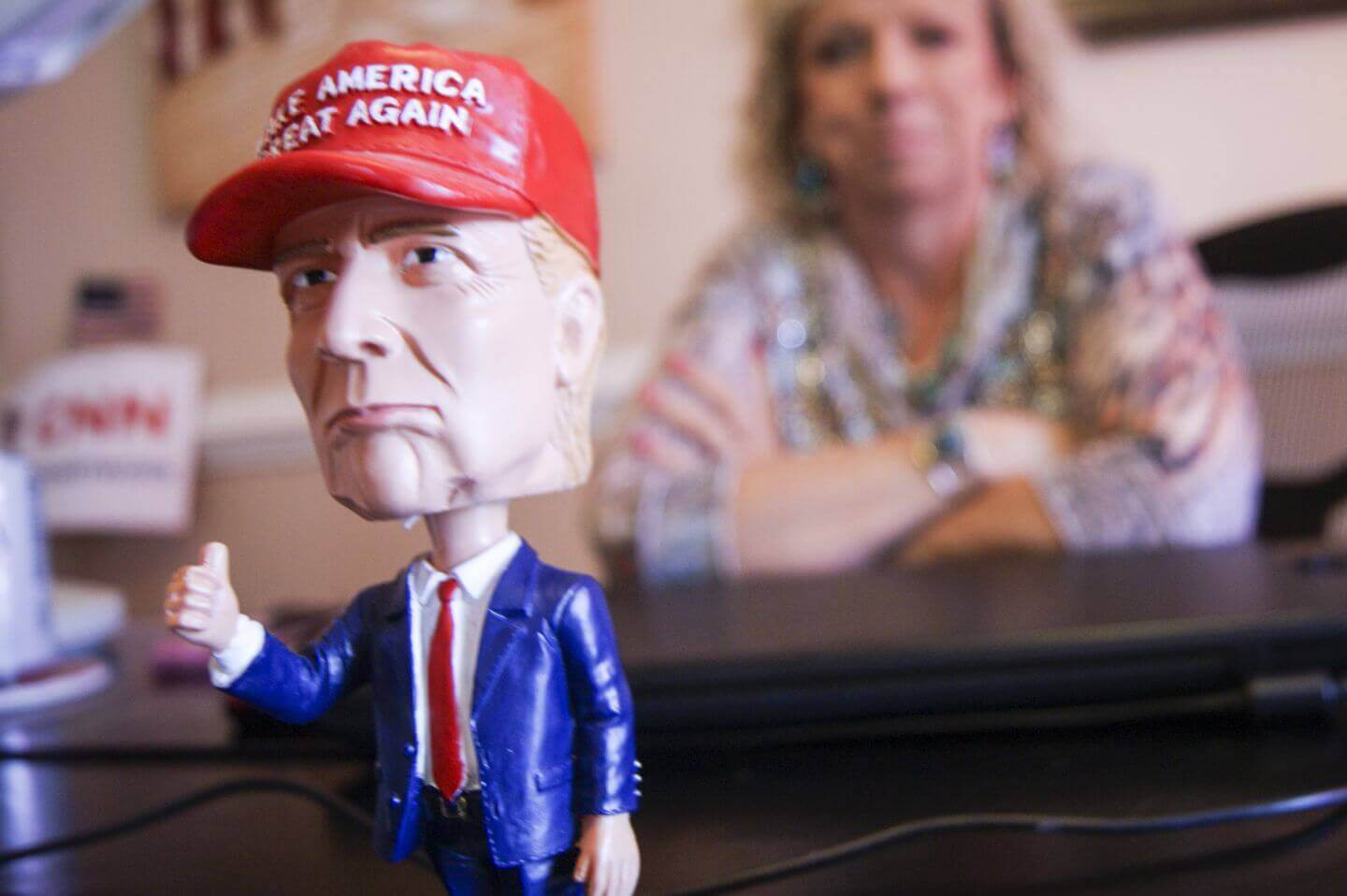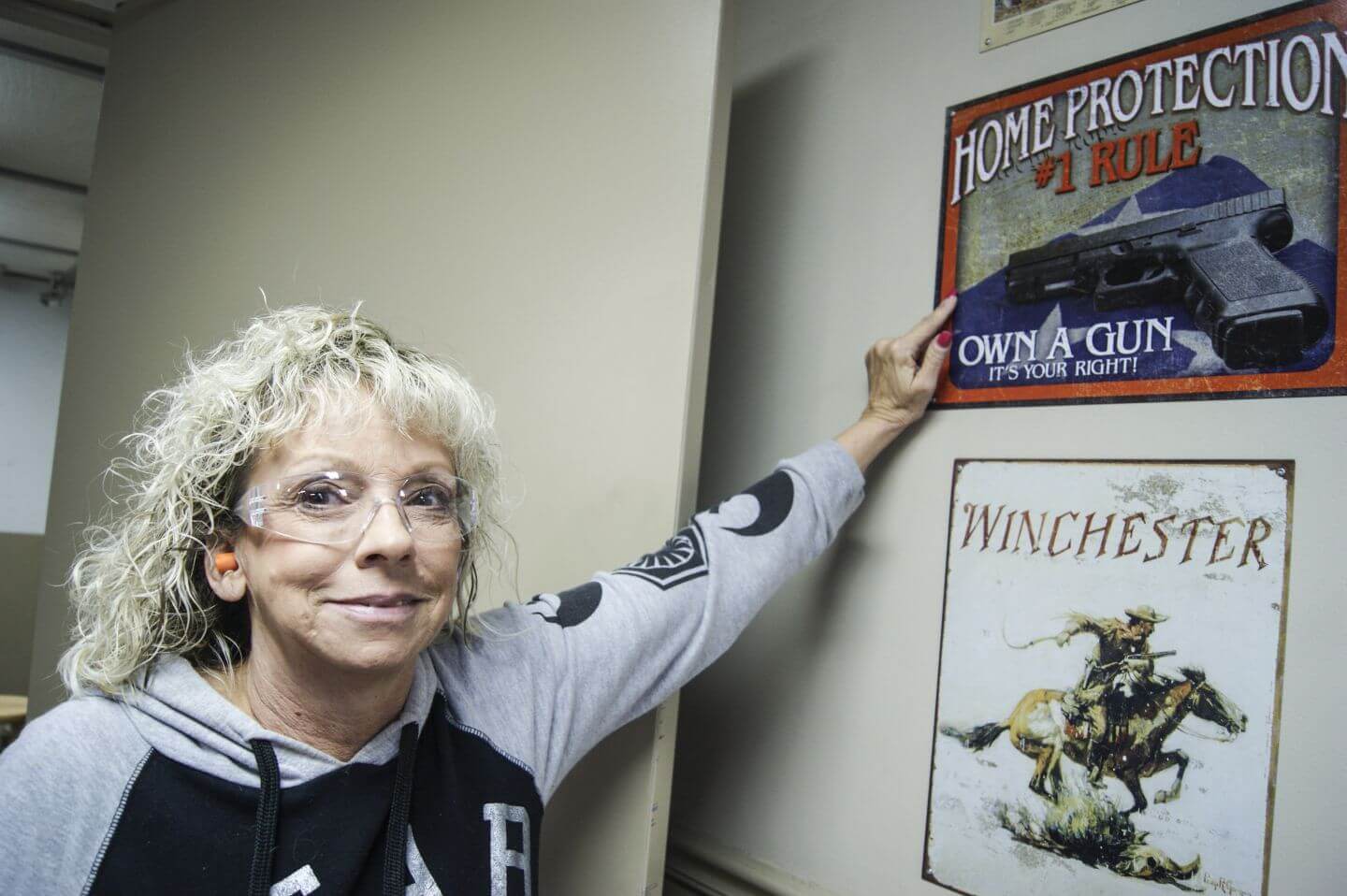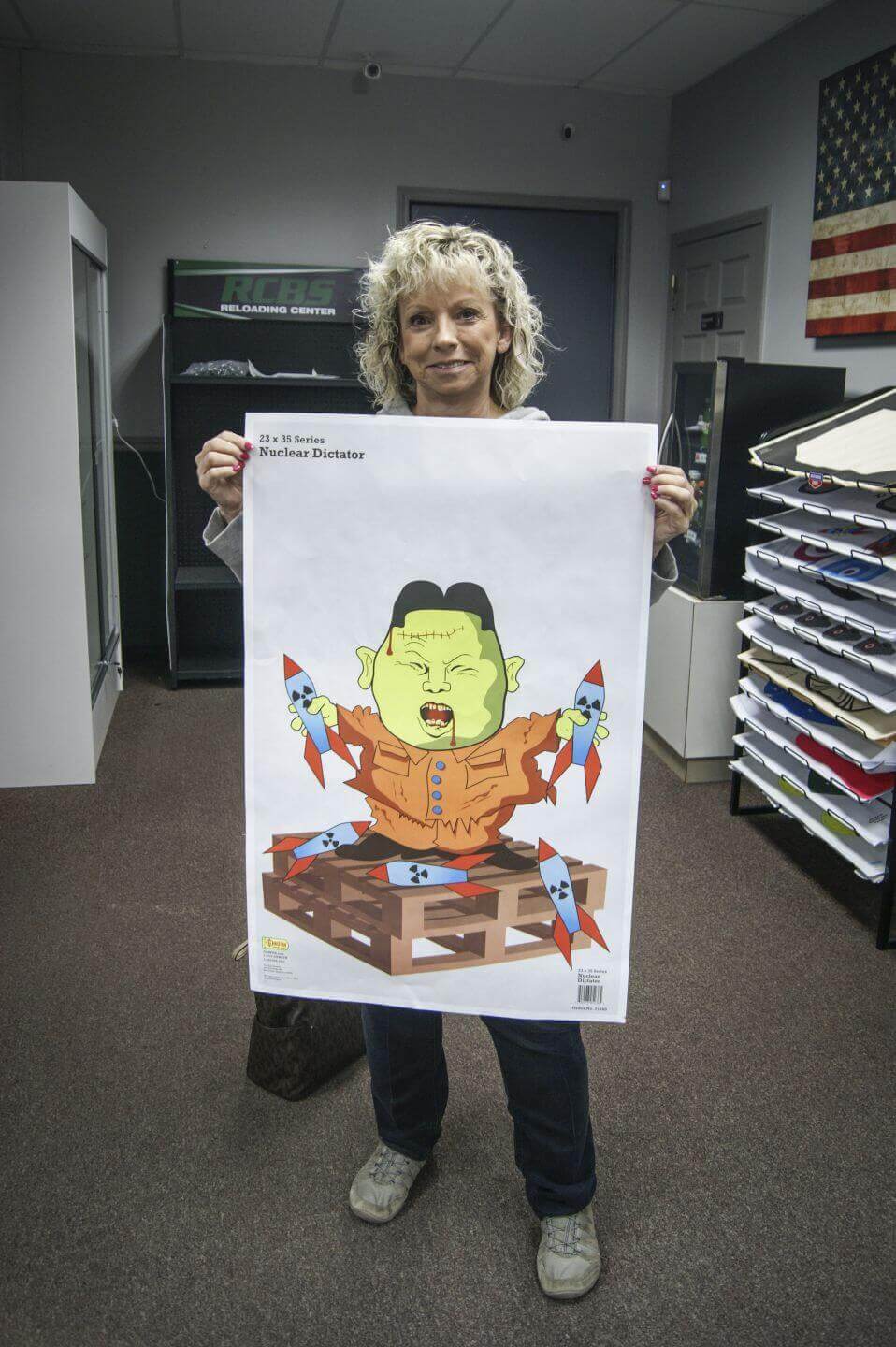Our reporter, Dawid Krawczyk, flew to the southern American state of Georgia to better understand the people who pushed Trump to the presidency. Who are these people? How do they imagine their future? Is Trump’s America the country of their dreams? And most importantly, what caused pious southerners to vote for a bombastic Northerner?
Explore the answers in the first chapter of this Political Critique series. | Text: Dawid Krawczyk. Illustration: Anna Pluta.
I.
II.
III.
IV.
I just know that I’m a good candidate – they got nothing on me
***
I.
Bang! Bang! Bang!
Pop!
And again: Bang! Bang! Bang!
I’m shooting the target 20 feet in front of me with a 9mm Glock. After the third shot, a hot shell hits my plastic glasses. A bit surprising. Though my finger automatically gets back to the trigger and sends the next round into the circular belly of an angular human-shaped target.
Bang! Bang! Bang!
Debbie Dooley is standing a few feet behind my lane and is happily recording this shooting debut of mine. She firmly holds her phone in a pink case.
“You did good! That was okay!” she says enthusiastically.
We met two hours ago at her place. Eight years ago she co-founded the Tea Party, a conservative wing of the Republican Party that calls for lower taxes, fights against Obamunism (an alleged hybrid of Obama policies and communism), revolutionized American politics and eventually made way for Trump’s victory. A year ago she voted in the presidential elections. And she won.
***
Debbie is from Alabama, but for the last couple of years, she’s been living in the heart of the Bible Belt, in Georgia, the Peach State of the American South, or Deep South, as locals will correct me later. Georgia is the birthplace of Martin Luther King Jr., but also where the Ku Klux Klan were reborn in 1915. When Obama won his first term, the Deep South preferred John McCain, four years later they voted Mitt Romney. A year ago, their candidate finally won, and his name was Donald J. Trump.
“He’s different than on TV. Very personal, listens to people, he cares deeply about them.”
“This is Peachy, because of Georgia, the Peach State,” at the door Debbie introduces me to her hyperactive Chihuahua which races around our legs. “And this is Donald,” she jokingly shows me a bubblehead figure of the 45th President of the United States. I poke the disproportionally big cranium with its blond (is it really blond?) hair and a big red baseball cap. Trump shakes his head smoothly and we find a place in the dimmed out living room, a refuge from the tropical heat outside.
Last year was definitely not Debbie’s first election. She got involved in Republican politics as a student in 1976. She was appointed as a delegate to the National Republican Convention twice, where she decided who would run. She even met Trump in person, before he’d made up his own mind about running. “He’s different than on TV. Very personal, listens to people, he cares deeply about them,” she says.
Her most important political memory? 1989 and Ronald Reagan’s farewell address after his second term.
“After Reagan, the Republican Party started going downhill.”
“We were just… All the women were just boohoo! We all had to run to the restroom and straighten up our makeup and the whole room was just crying because of Reagan,” Debbie recalls nostalgically. “After Reagan, the Republican Party started going downhill. Special interests began to control it. That’s it. Big money came in.”
She was always conservative and she’s sure it will be like that forever. Despite this she genuinely believes in renewable energy, and if she could, she’d mount solar panels on each and every rooftop in Georgia and after that the whole US. Global warming? She wouldn’t like to get into that debate as it’s just another topic that polarizes Americans. According to Debbie, you don’t have to be liberal, or progressive, or on the left to promote renewable energy. “You don’t make it about climate change, you make it about energy choice, energy freedom and all of a sudden you have a receptive audience. It’s all about the message.” Another topic that distinguishes her from most of the talking heads on Fox News is Edward Snowden. “I’ve followed WikiLeaks. I’m one of those people who doesn’t think Edward Snowden is a traitor. He let us know that our government was spying on us.”
I throw in that her views are completely opposite to what Trump is saying. He announced that the US will pull out from the Paris climate agreement and pretty straightforwardly called for Snowden’s execution. Debbie doesn’t seem to be bothered by this.
“There is one thing that people have to understand. He has a larger than life personality, he’s not politically correct. He says ‘I’m going to fight for you’, and he doesn’t back down. This is all true, but the key to understanding his success is the Trump Doctrine. That’s what he talked about on the campaign trail and that’s why people were drawn to him.”
“Which is what exactly?”
“The America First agenda, cancelling trade agreements and bringing jobs back to America. Immigration, his promise to stop illegal immigration. We have a right to secure our borders and to determine who comes to our country. Not getting involved in war after war after war. He had this non-interventionist approach.”
Debbie is not really attached to the last part of the doctrine. She doesn’t consider herself a foreign policy hawk and doesn’t support the interventions in Syria (“Neither side is good, so let them kill each other.”), but she is definitely positive about NATO. “I’m very big on NATO. It did bother me when he said some of the things he said about NATO. I can remember how important it was for Poland. I can remember when Leck, Lek, Valeza…”
“You mean Lech Wałęsa?”
“Exactly, Lech Wałęsa and Ronald Reagan…”
And with Reagan we’re back in 1989, the endless sea of tears, ladies bathrooms, and even more tears. Despair.

As we sip root beer I ask about the pictures hanging on the walls. In decorated frames, there are pictures from the most memorable moments in the history of the Alabama Crimson Tide university football team (Bama for short). Debbie isn’t excited about NFL, the biggest football league in the world, because it’s just another soulless corporation. But when the Bama elephants play she’s completely cut off from the world outside her living room and watches the game.
If there’s one thing that turns Debbie on as much as watching two armies of guys in plastic armour, it’s guns.
***
“Shooting range is about 20 minutes from here. If you want to go, we can go,” Debbie proposes. “In Poland, you don’t shoot? Do you want to be like sitting ducks? Let me call and see if they have an AR15 (assault rifle). I can call my friends, they have a bunch of guns, but not like this guy in Las Vegas,” she laughs.
Less than 24 hours ago I was sitting in a plane flying over the Atlantic Ocean watching Stephen Paddock shoot round after round into a crowd of random people on a small screen on a headrest. On blurry videos recorded with phones, you could only hear the blunt rumbling of a rifle, screams, shrieks, and yells. Amateur recordings were mixed with glossy “Breaking News” headlines and hastily prepared “Vegas Shooting!” graphics. Every half an hour a new update from the hospitals with a new number of casualties stormed onto the screen.
“It is the deadliest mass shooting in modern US history,” CNN anchors announce with disturbing excitement. And then for almost 10 hours of the flight, they report solely on that. An American Horror Story Live! Experts in the studio ask if it’s high time to introduce stricter gun control. Almost 24 hours later Debbie asks me if I would like to shoot a couple of rounds.
“Yep, of course,” was the only possible answer.
***
Revolvers, rifles, shotguns, purses with a special place to hold a firearm, and oddly small handguns (for the kids to hunt with, as the seller tells me later). They come in matt, metallic, black, silver, and gaudy neon colours – the latter look like toys. Only the loud noises behind the wall remind us they aren’t.

“Look, I want to buy one of these next week. It’s a Taurus Judge. Classic model,” Debbie holds two revolvers and listens to the seller who is playing with the barrels in the most theatrical way possible.
“They’re basically the same. The only difference is that in this one the barrel is black and in that one, it’s stainless steel. In both of them, you can load two types of ammo…”
“Yes, I know that very well, bullets and shotgun shells,” Debbie interrupts him almost instinctively. And with that she wins a look of respect and admiration. Speaking over each other, they explain to me the uniqueness of that weapon.
“With bullets…” the guy starts.
“… you have to aim really precisely. And when you shoot the aggressor you would only make a small hole in him,” accompanies Debbie.
“Exactly. And with shotgun shells…”
“… you shoot once and you swipe the target out of your sight…”
“Exactly.”
“It’s better for women, so they don’t have to aim so thoroughly,” Debbie goes off like a machine gun and finishes this little oration.
The new gun is for next week. This week is training. Debbie chooses a semi-automatic Glock 9mm for me. From the shop assistant, I receive two sheets of paper printed with the smallest font I’ve ever seen. I ask to make sure it’s a regular liability waiver, meaning if something bad happens behind the doors the owners won’t be obliged to cover any costs of my recovery. “Yep, more or less you’re right. Maybe you should watch a short video with the basic rules of shooting a weapon,” the shop assistant suggests.
Shortly after learning the fundamentals of shooting I’m standing with Debbie in the range and we’re pushing golden bullets into a clip. Click. I pull the lock. It clings together. I put my hands firmly on the grip and feel I’m ready.
Bang! Bang! Bang!
There are no staff in the room. Some overexcited guy is waving his 9mm in a lane next to us, and a deadly-serious couple is packing their guns in the back.
“You work with guns?” Debbie asks amicably. “Well, in a way. We’re real estate agents. In this business, you never know and you have to be prepared for everything.”
“You see, Dawid, I told you so! People here don’t want to be sitting ducks. They want to protect themselves. Just imagine terrorists trying to come to our land. Oh, we’ll show them how the South can protect itself!”

***
An hour later I’m back in the navy blue SUV I rented that morning, trying to set up the GPS from Debbie’s place to my hotel. A two-hour drive ahead of me, through rush-hour Atlanta traffic. Thank god I found a radio station promoting local trap music.
When I finally arrive at my shithole hotel (here they call it Extended Stay, but in reality, it’s a typical workers’ hotel), I can still feel the gunpowder in my throat. In my nose too. But when I get back to my room it mixes with the odour of some utterly disgusting cleaning product. What’s that smell? Damn, I know. It’s a washing powder for scabies. The only good thing here is that at 10 o’clock on the dot, half the hotel starts smoking weed, so the scent of disinfection chemicals dies out and gets replaced by dense clouds of purple smoke.
Welcome to Atlanta!
Versace, Versace, Versace…
![Political Critique [DISCONTINUED]](http://politicalcritique.org/wp-content/uploads/2015/09/Political-Critique-LOGO.png)
![Political Critique [DISCONTINUED]](http://politicalcritique.org/wp-content/uploads/2015/09/Political-Critique-LOGO-2.png)